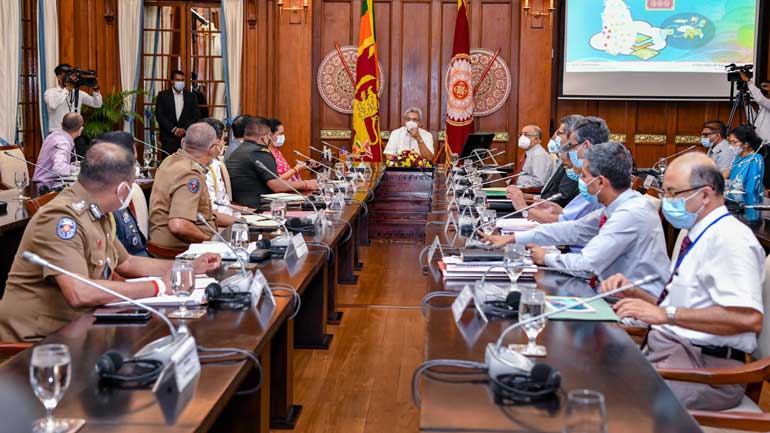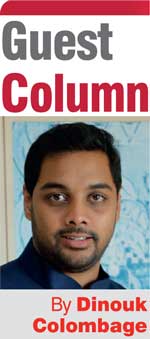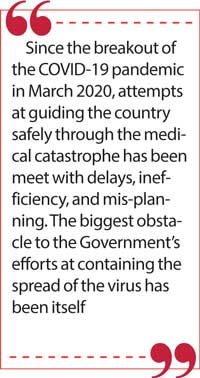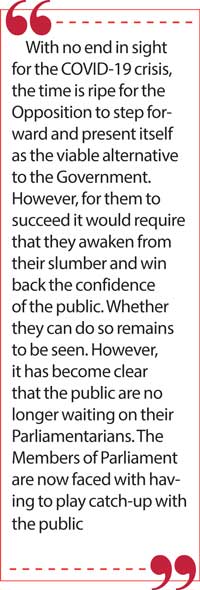Sunday Feb 22, 2026
Sunday Feb 22, 2026
Thursday, 3 June 2021 00:00 - - {{hitsCtrl.values.hits}}

Since the arrival of the pandemic on Sri Lankan shores, three separate Ministries and a Presidential Taskforce have been established and empowered with tackling the crisis. It is little surprise that, with as many as four separate arms of Government tasked for this purpose, there have been delays and miscommunication
“A Government’s first duty is to protect the people, not run their lives” – Ronald Reagan, 40th US President
 A democracy sans leadership will often see chaos and instability sprout amongst the populace. Sri Lanka’s political landscape is fast resembling a rudderless ship, aimlessly drifting whichever way the tide flows.
A democracy sans leadership will often see chaos and instability sprout amongst the populace. Sri Lanka’s political landscape is fast resembling a rudderless ship, aimlessly drifting whichever way the tide flows.
Since the breakout of the COVID-19 pandemic in March 2020, attempts at guiding the country safely through the medical catastrophe has been meet with delays, inefficiency, and mis-planning. The biggest obstacle to the Government’s efforts at containing the spread of the virus has been itself.
Since the arrival of the pandemic on Sri Lankan shores, three separate Ministries and a Presidential Taskforce have been established and empowered with tackling the crisis. It is little surprise that, with as many as four separate arms of Government tasked for this purpose, there have been delays and miscommunication.
The result has been a Government incapable of presenting any concrete plans to address the grave concerns caused by the virus. The failure on the part of the authorities to step up in a time of need has been highlighted by the public taking matters into their own hands.
Following the increase in infections after the Sinhala and Tamil New Year holidays, there was a demand that a nationwide lockdown be enforced. Members of the medical community were unified in their please that the country enter a two-week lockdown. They believed this would help stem the tide of new cases. These appeals fell on deaf ears, with the Government choosing instead to pursue targeted isolations.
While the numbers continued to rise, the Government remained steadfast in its decision to keep the country open. Questions have since emerged as to whether the Government’s economic agenda was put ahead of the medical community’s advice. In the space of six weeks (beginning 8 April) the Colombo Port City Economic Commission bill was tabled in Parliament, challenged in the Supreme Court, a ruling delivered, a two-day Parliamentary debate held, and the bill passed by vote.
On 20 May, the bill was passed by Parliament, on 21 May the Government decided to adhere to the medical community’s advice and announced nationwide travel-restrictions. This was reminiscent of the Government’s previous delay to lock the country down at the onset of the first COVID-19 wave in March last year. On that occasion the authorities chose to delay the announcement till the nomination papers for the General-Election were filed, thereby effectively sealing the dissolution of Parliament. 
On this occasion it appears as though the Government delayed the lockdown due to the pending Colombo Port City Economic Commission bill. Once this piece of legislation was signed, sealed, and delivered the Government returned their attention to the advice of the medical authorities.
However, the continued disconnect and blatant refusal to abide by the wishes of the public and medical professionals, by the Government, was met with previously unseen public action. As news continued to highlight the growing number of COVID-19 cases, the citizens adopted a “self-imposed” lockdown. Many private companies instructed their employees to work from home, social visits were postponed and soon the city roads represented a community in partial lockdown.
It was the first clear indicator that the Government had lost the confidence of the public who had, just last year, handed them a resounding victory at the General Election.
Prior to the current extended travel-restrictions the Government attempted to enforce a three-day lockdown. It took them over four hours of continual press announcements full of contradictions, retractions and corrections before the final plan was presented. The ridicule and confusion amongst the public was an indicator that the Government’s multi-armed approach to the pandemic was not working. It was also a clear representation of the Government’s lack of direction and planning.
While the administration is on the downhill trajectory, public confidence in the Parliament has also taken a beating. At a time when the Government is edging towards oblivion, the Opposition within Parliament remains fragmented.
In October last year Member of Parliament for the TNA, M.A. Sumanthiran, presented a Public Health Emergency bill as a Private Members Motion. This bill, which had been co-drafted by him and former Prime Minister Ranil Wickremesinghe in April 2020, was originally presented to the Government to no avail. Having since been presented to Parliament by Sumanthiran, it has not managed to muster meaningful support from the members of the Opposition. At a time when the country is desperately in need of a new strategy to combat this pandemic, such legislation is vital. 
The role that Parliament could play in this situation has been largely overlooked by the public due to the absence of any meaningful action. The Opposition has lacked a clear strategy in ensuring that the Government does not deviate from its responsibilities. Messaging from the Opposition ranks has been disjointed and short-lived. Topics of discussions have ranged from the costing of vaccine doses to the pollution of the Diyawanna Oya. However, the failings have been in the inability of the Opposition to maintain a concentrated campaign on a single topic.
At a time when the country is facing a rapidly-spreading third wave of the COVID-19 virus, the absence of a coordinated effort to maintain pressure on the Government is being seen through its continued pursuance of their failed strategies. By virtue of the position they inhabit, a government is placed upon a platform of responsibility. However, an Opposition has its own responsibility to the public.
In the UK, the Opposition is dubbed “Hey Majesty’s Loyal Opposition”. This is a reminder that while these members are opposed to the Governing party, they remain loyal to both the Monarch and the Constitution. Furthermore, in a showing of preparedness, their Opposition continues to maintain a shadow Cabinet. An indication of their readiness to undertake duties of the Government at a moment’s notice.
In Sri Lanka, this level of readiness appears missing. While the Opposition must remain loyal to the public and Constitution, their actions suggest otherwise. Questions over the loyalty of the Opposition to public have arisen by their apparent inability to ensure the full powers of Parliament are enforced in keeping the Government in check.
With no end in sight for the COVID-19 crisis, the time is ripe for the Opposition to step forward and present itself as the viable alternative to the Government. However, for them to succeed it would require that they awaken from their slumber and win back the confidence of the public. Whether they can do so remains to be seen.
However, it has become clear that the public are no longer waiting on their Parliamentarians. The Members of Parliament are now faced with having to play catch-up with the public.